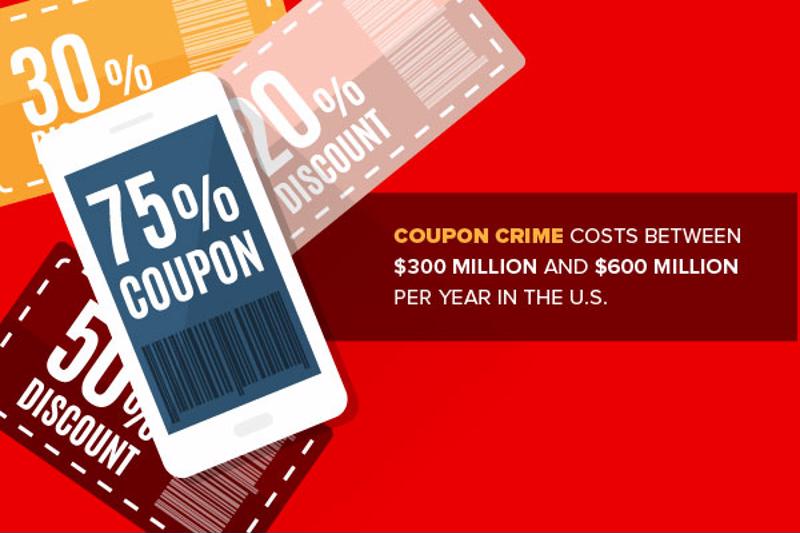Coupon fraud could be costing your business millions
Credit to Author: Trend Micro| Date: Mon, 13 Nov 2017 15:58:33 +0000

Customers are always looking for good deals with their purchases and a coupon could be the defining factor for a buyer completing his or her transaction. In fact, a 2015 survey by CreditCards.com found that paper coupons were used by 63 percent of respondents. This is followed by discounts for online and mobile purchases. Distributed coupons are valued at billions of dollars every year and companies continue to use these techniques to attract consumers for their business. However, there is a darker side to couponing: fraud. The real-life costs of this crime go beyond the deals consumers get and could be costing your business millions.

What is coupon fraud?
Coupon fraud comes in a variety of flavors. Normally, coupon transactions are simply data changing hands between the consumer, coupon providers and an agent that sorts and audits the coupons. Because there are so many layers, only one needs to be vulnerable to affect the whole supply chain. The Balance noted that shoppers often participate in coupon fraud by making multiple copies of the coupon, using the discount for products that extend beyond those listed in the terms, stealing newspaper inserts and buying or selling coupons. When consumers don't stick to the rules for printing out coupons or abiding by the usage agreements, this is considered illegal activity and leaves businesses covering the cost.

Just how damaging is it?
When a business accepts a counterfeit coupon or scans and authorizes a deal for products that aren't listed on the coupon, it might not be caught at first. It can even seem like a small occurrence compared to all of the other transactions that the business might see throughout the day. However, PennLive put realistic estimates of coupon crime costs between $300 million and $600 million per year in the U.S. While losses will vary per organization, this is still no small price to pay for any business.
With such a lucrative market, cyber criminals are taking advantage of coupon fraud for their own payday. In fact, Trend Micro stated that coupon fraud's scalability results in business process compromise, which undermines business operations components and significantly impacts the bottom line. Fraudsters can generate purportedly valid coupon codes and distribute them to unknowing consumers. New customer promos are also sold in bulk in the underground, which allow buyers to take advantage of perks given upon account registration. These occurrences mount up, earning criminals money while costing your business.
Be aware of distribution channels
How coupons are sent to customers can be an important factor in coupon fraud cases. Social media in particular is being used more for delivering great deals and acting as a marketplace for potential transactions. Cyber criminals have identified this tactic and are devising their own legitimate looking coupons or discounts to scam social media users. According to Consumer Affairs, a recent online coupon scam promised deals on popular consumer products. The catch was that the buyer would need to provide their credit card information or personal identifying data in order to get the coupon. Fraudsters could then sell this data on the underground market and use it for identity theft.
If your business decides to market through social media, it's important to show that your page is verified. This could help consumers better identify real deals while still attracting revenue opportunities through the social channels. As cyber criminals continue to create legitimate looking coupon codes and scams, it will be integral for organizations to direct customers to actual discount pages.
Spotting and stopping fake coupons
For businesses and consumers alike, coupon fraud is a major problem. Businesses increase the prices on products to make up for the losses, which then impacts consumers that seek to legitimately use coupons. This cyclical occurrence will continue as long as fake coupons are distributed. There are a few signs that organizations should be wary of:
- Coupons without bar codes.
- Discounts where a purchase isn't required to redeem it.
- Deals that are more than the actual price of the item.
- Coupons that don't have conditions of usage on them.
Cashiers themselves must be trained on how to use coupons properly and catch potential fraud cases.
Smart coupon creation can make a big difference in identifying legitimate ones over counterfeits. Trend Micro suggested putting safeguards in place like limiting the reuse, distribution and time limit for coupon codes. Businesses can also personalize coupons and use anti-counterfeit techniques like complex data codes, watermarks, code authentication and microprinting to deter scammers from duplicating codes and deals. Leaders must also work with distributors, stakeholders and law enforcement to establish stronger fraud resistance and risk management policies for coupon programs. All the while, organizations need to maintain the privacy, security and integrity of their infrastructure that manages critical processes.

Don't be duped this holiday
As the holiday season approaches, more businesses will start coming out with sales and deals on their products and services. However, it's also the perfect time for cyber criminals and coupon counterfeiters to make a quick payday off of unsuspecting victims. Consumers must take care to check over their coupons for terms of agreement and remain wary of deals that ask for personal information, particularly those distributed through social media sites.
Organizations must take action now to determine the best distribution strategy for their sales marketing strategy while also designing their coupons to limit fraud opportunities. Here, a time limit mark could be a great solution, along with design choices to reflect the holiday season. This makes it much harder for criminals to replicate and helps consumers identify which deals are legitimate. Retailers must be prudent to ensure buyers play by the rules to get freebies and discounts.
Safeguards will limit coupon fraud and prevent abusers from repeatedly cashing in on coupons this holiday season. To find out more about how much coupon fraud might be impacting your business and what you can do to stop it, contact Trend Micro today.